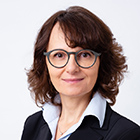PhD students participating in August Krogh seminars receive 0,2 ECTS per seminar
AKC seminar: Targeting Metabolic Reprogramming in Polycystic Kidney Disease and Other Renal Ciliopathies
 August Krogh Seminar
August Krogh Seminar
Alessandra Boletta
PhD, Head of Unit, San Raffaele Scientific Institute, Milan, Italy.
Abstract
Autosomal Dominant Polycystic Kidney Disease (ADPKD) is a renal ciliopathy and the most frequent renal genetic disorder affecting humans. The disease is due to loss-of-function mutations in several genes, the two most frequently mutated: PKD1 in 85% of cases or PKD2 in the remaining 15%, the first encoding for a large membrane receptor (Polycystin-1, PC-1) involved in signaling and the second for a cation channel (Polycystin-2, PC-2 or TRPP2) interacting with and regulated by PC-1. Notably, identification of the Polycystins as ciliary proteins provided the first evidence of the relevance of primary cilia for human health.
About decade ago, my lab discovered that aerobic glycolysis (Warburg effect) is a key feature of PKD and that 2-Deoxy-D-glucose (2DG), a glucose competitor, retards disease progression in animal models. These alterations resemble the ones observed in cancer, including in renal carcinomas. In follow-up studies we found that PKD cells compensate for the lack of glucose-derived pyruvate utilization in the TCA cycle by importing glutamine used both for anaplerosis to ensure maintenance of the mitochondrial membrane potential and for minimal oxidative phosphorylation. In PKD, this operation requires the presence of the enzyme Asparagine Synthetase (ASNS).
More recently we came to the discovery that primary cilia sense (and respond to) the extracellular levels of glutamine. Indeed, primary cilia contribute to the cellular response to metabolic stress by sensing and favoring the mitochondrial use of glutamine, a non-essential amino acid, which becomes conditionally essential during stress. This property is shared by sensory cilia in multiple different cell types derived from multiple organs both in vitro and in vivo. Notably, we found that the enzyme asparagine synthetase (ASNS) mediates the glutamine sensing in primary cilia opening the possibility that additional ciliopathies might share metabolic alterations like those of PKD.
We propose a model in which primary cilia, and their repertoire of receptors, play a fundamental role in sensing extracellular nutrient availability and in communicating this information to mitochondria, allowing fine tuning of their catabolic and anabolic activity.
Research Profile
Dr. Boletta graduated in Biology at the University of Pavia, Italy. She carried out her Ph.D-equivalent training at the Mario Negri Institute in Bergamo, Italy working on gene delivery to the kidney prior to moving to the Johns Hopkins University, Baltimore, MD, USA for her post-doctoral training. Here, she started her scientific activity on Polycystic Kidney Disease, by working on heterologous expression of Polycystin-1 aimed at establishing cellular models to investigate the Polycystins function.
She moved back to Italy thanks to a Telethon Career Program to establish her lab at the San Raffaele Scientific Institute in Milan. Here, she covered the position of Director for the Division of Genetics and Cell Biology (2014-2019) and she is currently Head of Research Unit. Over the years her lab has developed several cellular and animal models with the aim of studying Polycystins function and the pathophysiology of ADPKD. Her laboratory has identified metabolic reprogramming as an important feature of the disease, offering several new options for therapy as well as novel insights into the pathogenesis of ADPKD.
She received numerous prizes for her activities the most notable a Marie Curie Excellence Team Leader Award by the European Union, and the Lillian-Jean Kaplan Award for discoveries in PKD by the International Society of Nephrology. She recently was awarded an ERC advanced grant.
Literature
https://doi.org/10.1038/nm.3092
https://doi.org/10.1681/ASN.2015030231
https://doi.org/10.1038/s42255-023-00754-6
https://doi.org/10.1038/s44321-024-00071-9
https://doi.org/10.1681/ASN.0000000507
Time
28 February 2025
14:00-15:00: Seminar and discussion
15:00-16:00: Post seminar servings and socializing
Venue
Auditorium 1, August Krogh Building, Universitetsparken 13, DK-2100 Copenhagen
Registration
Participation is free, but please register here.
For PhD students
PhD students participating in August Krogh seminars receive 0,2 ECTS per seminar
Contact
Kate Aiko Wickham, kawi@nexs.ku.dk

